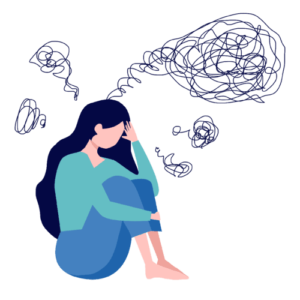
Eating Disorder Test
Answer these simple questions to understand more about your Eating Disorder. We share instant results and keep your information confidential.

What is Eating Disorder Test?
Eating disorder assessment is a systematic evaluation process to identify and diagnose eating disorders such as anorexia nervosa, bulimia nervosa, and binge-eating disorder. It involves gathering information about the individual’s eating behaviors, attitudes towards food and body image, physical health, and psychological well-being. Healthcare professionals use various tools and interviews to assess the severity and type of eating disorder, allowing for appropriate treatment planning and intervention. Early detection and accurate assessment are crucial for providing effective support and addressing the complex challenges associated with eating disorders.
Who can benefit from this Eating Disorder Test?
Anyone who suspects they may be struggling with an eating disorder can benefit from eating disorder assessment. This includes individuals experiencing abnormal eating patterns, body image issues, weight fluctuations, or emotional distress related to food and eating habits. The assessment helps identify the presence and severity of eating disorders, guiding appropriate treatment and support. It is essential for adolescents, adults, and individuals of all genders. Timely assessment can prevent long-term health complications and improve the chances of successful recovery through targeted interventions, counseling, and medical care.


Eating Disorder Test Accuracy
The accuracy of eating disorder assessment can vary depending on several factors. When conducted by trained healthcare professionals using standardized and validated assessment tools, the accuracy is generally high. However, misdiagnosis or underreporting of symptoms can occur due to the secretive nature of eating disorders and reluctance to disclose behaviors. Additionally, comorbid mental health conditions can complicate the assessment process. To enhance accuracy, regular follow-ups, comprehensive evaluations, and multi-dimensional assessments are necessary. Early detection and intervention play a critical role in improving assessment accuracy and facilitating successful treatment outcomes.
Types of Eating Disorder Test
EDE-Q:
Eating Disorder Examination Questionnaire assesses eating disorder symptoms, behaviors, and attitudes.
SCOFF:
A simple screening tool consisting of five questions to detect potential eating disorder cases.
BITE:
Bulimic Investigatory Test, Edinburgh, identifies bulimic behaviors and attitudes towards food.
EAT-26:
Eating Attitudes Test evaluates eating disorder risk and concerns about weight and body shape.
DSM-5 Criteria:
Test based on Diagnostic and Statistical Manual of Mental Disorders criteria for diagnosing eating disorders.
MARS:
Maudsley Anorexia Nervosa Treatment for Adults assesses the severity and progress of anorexia nervosa during treatment.
Handling Eating Disorder
Handling eating disorders requires a comprehensive approach that involves professional help, support from loved ones, and a commitment to recovery. Eating disorders are serious mental health conditions that can have severe physical and psychological consequences, so it’s essential to seek help as soon as possible. Here are some steps you can take to address eating disorders:
- Seek Professional Help: Reach out to a healthcare professional, such as a psychologist, psychiatrist, or a specialized therapist who has experience in treating eating disorders. They can provide an accurate diagnosis, assess the severity of the disorder, and create a personalized treatment plan.
- Educate Yourself: Learn about the specific eating disorder you or your loved one is dealing with (e.g., anorexia nervosa, bulimia nervosa, binge-eating disorder). Understanding the underlying causes and triggers can help you approach the situation with empathy and knowledge.
- Encourage Open Communication: Create a safe and non-judgmental environment for the affected person to talk about their struggles with eating. Encourage them to express their feelings and fears without fear of criticism or shame.
- Avoid Negative Remarks: Refrain from making comments about their appearance, weight, or eating habits, as these may exacerbate the problem and contribute to feelings of shame and self-doubt.
- Promote a Balanced Approach to Health: Encourage a balanced lifestyle that focuses on overall well-being, not just weight or appearance. Emphasize the importance of mental and physical health, balanced nutrition, and regular exercise for overall well-being.
- Support Recovery Efforts: Recovery from an eating disorder can be challenging, so be patient and supportive throughout the process. Celebrate progress and small victories while understanding that setbacks may occur.
- Involve a Registered Dietitian: Collaborate with a registered dietitian who specializes in eating disorders to create a structured and healthy meal plan that addresses the individual’s nutritional needs and supports recovery.
- Join Support Groups: Consider participating in support groups for individuals with eating disorders and their families. Connecting with others who have experienced similar challenges can be empowering and encouraging.
- Address Co-occurring Issues: Sometimes eating disorders are linked to other mental health conditions, such as depression, anxiety, or body dysmorphia. It’s crucial to address these co-occurring issues as part of the treatment plan.
- Safety Measures: If the eating disorder is severe and poses an immediate threat to the person’s health, it may be necessary to seek hospitalization or intensive outpatient treatment to ensure their safety.
Remember that overcoming an eating disorder takes time and commitment. Encourage the person to engage in treatment, but ultimately, they must take ownership of their recovery journey. Be patient, supportive, and compassionate throughout the process.